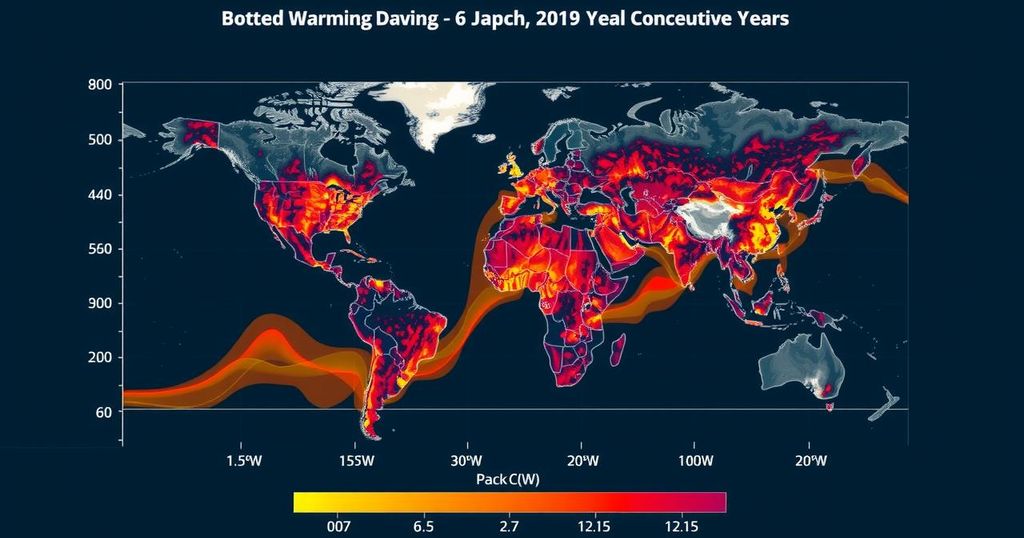For the third year in a row, global warming projections are stagnant, with emissions from major countries like China and the U.S. worsening the outlook. The UN climate talks in Baku focus on setting new emission targets and addressing financing needs of developing nations, highlighting a projected requirement of $1 trillion yearly for climate adaptation.
For the third consecutive year, climate change initiatives have failed to yield improved projections regarding the future increase in global temperatures. Recent analyses indicate that developments in major emitting countries, particularly China and the United States, may even worsen the outlook. As countries convene for the United Nations climate talks in Baku, Azerbaijan, efforts focus on establishing new targets to reduce emissions of heat-trapping gases and addressing how wealthier nations will support these initiatives. According to Climate Action Tracker, the Earth is on course to warm by 2.7 degrees Celsius above pre-industrial levels. This alarming projection underscores the urgency of actions taken during the United Nations climate negotiations, commonly referred to as COP. “There is an awful lot going on that’s positive here, but on the big picture of actually getting stuff done to reduce emissions … to me it feels broken,” stated Bill Hare, CEO of Climate Analytics. The global temperature has already increased by 1.3 degrees Celsius since pre-industrial times, edging dangerously close to the 1.5-degree threshold established during the 2015 Paris climate negotiations. Climate scientists point out that continued emissions from fossil fuel combustion are exacerbating extreme weather events, including floods and droughts. Current projections indicate a slight increase in possible warming scenarios, with a rise to 2.6 degrees Celsius anticipated based on national commitments made through 2030. “This is driven highly by China,” noted Sofia Gonzales-Zuniga, the study’s lead author from Climate Analytics, emphasizing that China’s emissions plateau is higher than previously expected. Additionally, upcoming U.S. elections could pose a risk by reverting to less stringent climate policies, potentially adding an estimated 0.04 degrees Celsius to warming projections. The reduction of U.S. financial aid could further hinder global efforts to mitigate climate change. In Baku, discussions center on the need for substantial financial commitments from developed nations to aid poorer countries in transitioning to low-carbon energy systems and adapting to climate impacts. Aiming for a new target beyond the expired $100 billion annual aid goal, a coalition of developing nations seeks up to $1.3 trillion in climate finance annually. An independent report commissioned by UN Secretary-General Antonio Guterres has estimated that approximately $1 trillion per year is required for developing nations to address climate-related challenges. The report emphasizes the necessity for advanced economies to demonstrate a credible commitment to support these nations. The urgent call for investment to transition to renewable energy, enhance resilience against climate impacts, and address loss and damage underscores the formidable challenges ahead. Overall, climate adaptation expenditures are projected to surmount $2.4 trillion yearly.
The article discusses the concerning stagnation in climate change mitigation efforts over the past three years, particularly in light of significant global projections regarding temperature increases. It highlights the role of major emitting countries, such as China and the United States, in shaping these projections and the critical discussions taking place during the UN climate negotiations. The emphasis on financial commitments from developed nations to assist poorer countries underscores the urgent need for immediate and effective action to combat climate change while addressing projected future impacts.
In conclusion, the ongoing failure to reduce projections for global warming represents a significant concern for climate change mitigation efforts. With the rise in emissions from key countries and the potential reversal of progress in the U.S. due to political changes, the urgency for decisive action is paramount. The financial needs of developing countries must be met to ensure broader global efforts to transition to sustainable energy sources and adapt to the impacts of climate change.
Original Source: www.voanews.com






